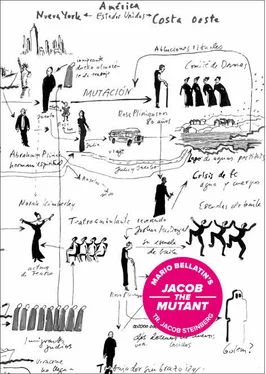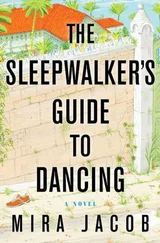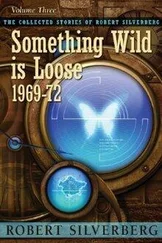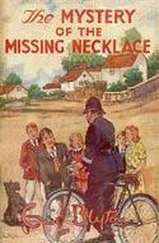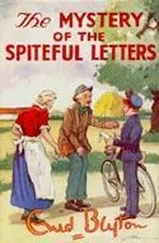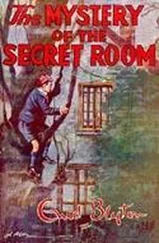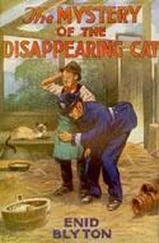It is not common that someone considered the rabbi of his community be afforded this time for personal interpretations. No less, Jacob Pliniak’s behavior is full of actions that, in some way, contradict the Scriptures. He then walks a half an hour to the house of his accomplice, known as the mysterious Macaque, the very one who years later, in New York City, would become the stage actress Norah Kimberley. He returns at midnight, bringing behind him a line of immigrants. Macaque has paid him his share of the money, that those men have given over for his assistance in their escape from the country, in rubles. The following day it will have to be Julia, Jacob Pliniak’s wife, who exchanges them in a grains shop where the owners speculate as to fluctuations in the coins of both regions. The immigrants stay hidden for two nights in the tavern. On Saturday morning, the group of refugees is brought up, stealthily, to a wagon driven by a lanky man. In those moments, Jacob Pliniak abandons his prayer room, situated a few yards from the tavern, and goes out to wish the unfortunate luck on their voyage. One of the most surprising discoveries for literature, not just for that of Joseph Roth but for all of twentieth-century literature, seems to be in the mechanism for how a role assigned to a particular character drifts, quite suddenly, into another, completely different one. Precisely when the reader assumes, quite plausibly, not just Jacob Pliniak’s presence in the text but, especially, his right to remain in its structure, our character transforms, with no great leap, into his supposed adopted daughter, Rose Plinianson, the highest authority of the women’s committee in the town where she lives. It all begins when, without any interruption, at a certain point in the plot, Jacob Pliniak finds himself living in America. He discovers himself in New York City, investigating the whereabouts of the actress Norah Kimberley, well known for her work in the traveling theater groups of the time. Jacob works in a store that markets goods, whose owner is one of the men that he helped cross the border years back. Jacob Pliniak is grateful to God that his ship was the last one able to enter the country without an entry visa required of its passengers. During the voyage, which was on the verge of ending in tragedy when, midway across the ocean, the navigation instruments on the ship broke, he became a spiritual brother to a boy named Abraham. That boy, whose origin lay in the Caucasus region, had witnessed, while hidden among rocks where he usually grazed his sheep, his village being burned down, with its inhabitants enclosed in the small synagogue. The presence in this passage, not only of this spiritual brother, Abraham, but also of the sheep, and above all, the fact that they grazed in a rocky place, stands out. It is apparent that in this part of the story, Joseph Roth is highlighting, in a direct way, the work’s mystical nature. Nevertheless, it does not cease to be strange that, during his ship’s passage through danger, there is no mention made of any fear of the Leviathan, that deep sea monster present in the majority of tales of this nature. Despite all else, the reference to the rocky place and the sheep is an element that cannot go unnoticed. Two years after his arrival, on one of the busiest streets, Jacob Pliniak stumbles not upon Norah Kimberley, but rather Julia, his old wife. The young Anselm has left her and she has a daughter named Rose. The woman carries out small tasks for community members, but essentially lives off public charity. Jacob takes pity on her. He suggests that they travel to the West Coast together. That is where Abraham Pliniak is living, his spiritual brother, who more than once has sent a letter begging for a reunion. In a very short time, Abraham had managed to amass a small fortune buying land from the few colonists left in the region. He then sold it to a group of refugees seeking a permanent place to settle down and live. Finding his old wife in those conditions seemed to be the sign for Jacob Pliniak to set out on the trip that his brother begged of him. He felt as if he were being given a second chance. He saw in Julia the possibility of having many children — something he had not been able to accomplish in his homeland, mainly due to the constant worry over Russian pogroms. He wanted children capable of passing his spiritual legacy along to future generations. He was even willing to accept Rose as his own daughter. Without thinking twice, he quit his job, picked up Julia and his daughter from the miserable room where they lived, and made the long journey by bus. Abraham Pliniak (nobody knows the reason why, when they became brothers on the ship, he took on Jacob’s surname, instead of his family, murdered in the village synagogue) designated a parcel of land to them on the shores of a lake. He then helped them raise a house. Initially, Jacob Pliniak thought of starting up a similar business, a tavern, like the one he had had in Korsiakov. He would rely on his wife Julia, who could help him with administration. They could, by the same token, appeal to a young man with no work, whom they would seek out among the children of the immigrant families, to collaborate. Jacob Pliniak seemed to want, once again, to wake up each day right when his wife, exhausted, sought rest. To find, just as before, his bowl of borscht placed on the stove. Although he would have liked to set up a business that only operated at night, having a tavern again didn’t seem like a good idea after all. It would be like returning to the past. He left these plans behind. He was content with the task of spreading the ideas found in the sacred texts. Jacob Pliniak became a teacher once again, very close to what could be considered a rabbi. He once again was close to children. He enjoyed going over, as if for the first time, the most suggestive passages of the Torah and Zohar. This, in turn, reinforced his desire to have children. At this point in the novel, a phrase appears that could be interesting in the context of understanding the author’s idea for taking on such a writing exercise. It asserts that, when Jacob Pliniak found out that he would once again interpret the sacred books for the community’s children, he said, to himself, that the letters and names are not just conventional means of communication. He asserted, rather, that they are actually the means by which faith carries out its own annihilation. It is precisely at this point, when Jacob Pliniak has uttered such a sentence, that we discover in the text that his work as a rabbi does not endure any great length of time. Nor does his interest in having children, one after another. Many of the families rooted in the region have begun to abandon their ancient beliefs. They have begun to try and forget the religion of their ancestors. At this moment Jacob Pliniak faces perhaps his life’s most important crisis of faith. Unfortunately it is not possible to compare the passages of this book,
The Border , with aspects of the private life of its writer, Joseph Roth. It will never be known under what circumstances he conceived any one of the book’s chapters. Bringing forth such an investigation could have, in some way, clarified certain problematic aspects of the tale that do not seem at all clear from even a literary perspective or a mystical point of view. It is only known that Roth worked on this text constantly, as he gave shape to other books; and that many of the abrupt changes in narration were attributable to reasons of a personal nature… that he even left many of the most significant pages lost for good. The fall of the Austro-Hungarian Empire, the writer’s wanderings through Europe, his adaptation to the prevailing German culture in Vienna, the rise of National Socialism, his uncontrollable alcoholism and his final condition as a poor and desperate refugee in Paris — a circumstance that ultimately brings him to a type of suicide — become a kind of unattainable key to the story. Maybe this is why the author narrates, at this point, a truly extraordinary event, that for many holds a relationship to the Jewish Sephirot, that is, to the sphere of divine emanations, in which the creative power of God unfolds. It has already been mentioned that Jacob Pliniak has acquired a plot of land on a lake; that he has constructed, with the help of his spiritual brother, a house where he lives with Julia, his wife, and Rose, his wife’s daughter whom he loves as if she were his own. It is also known that Jacob Pliniak has become a type of rabbi in a community characterized by its members’ slow and steady abandonment of their religion. Despite all of that, at this time he continues developing his personal ideas about water and the body. Thus he continues bathing himself, fully clothed, at unsuspected moments, soaking his feet in trays for hours upon hours, placing his hands in containers of salt water until his skin prunes up. The out of the ordinary fact described by Joseph Roth occurs when Jacob Pliniak submerges in the lake to carry out his daily ritual ablutions. Instants later he returns to the surface, having transformed into his own daughter. But not into the girl that we’ve known until now, but rather into an elderly woman, eighty years of age. Jacob Pliniak has acquired the body of an old woman, in whose memory the existence of a Jacob Pliniak is perhaps logged, a dead man that drowned while performing his ablutions in a lake upon whose shores he built his house. It’s important to point out that in the Kabbalah these transformations that entail person, gender, and time are referred to as “Aphoristic Pools.” The further distanced the person, gender, and time of the transformation, the closer the story comes to another dimension. Perhaps this is why the writer Joseph Roth dares not to just create this very particular episode, but also, just lines ahead, to insist that in the town, the one which the elderly woman Rose Plinianson must now face, hundreds of dance academies have sprung up.
Читать дальше
